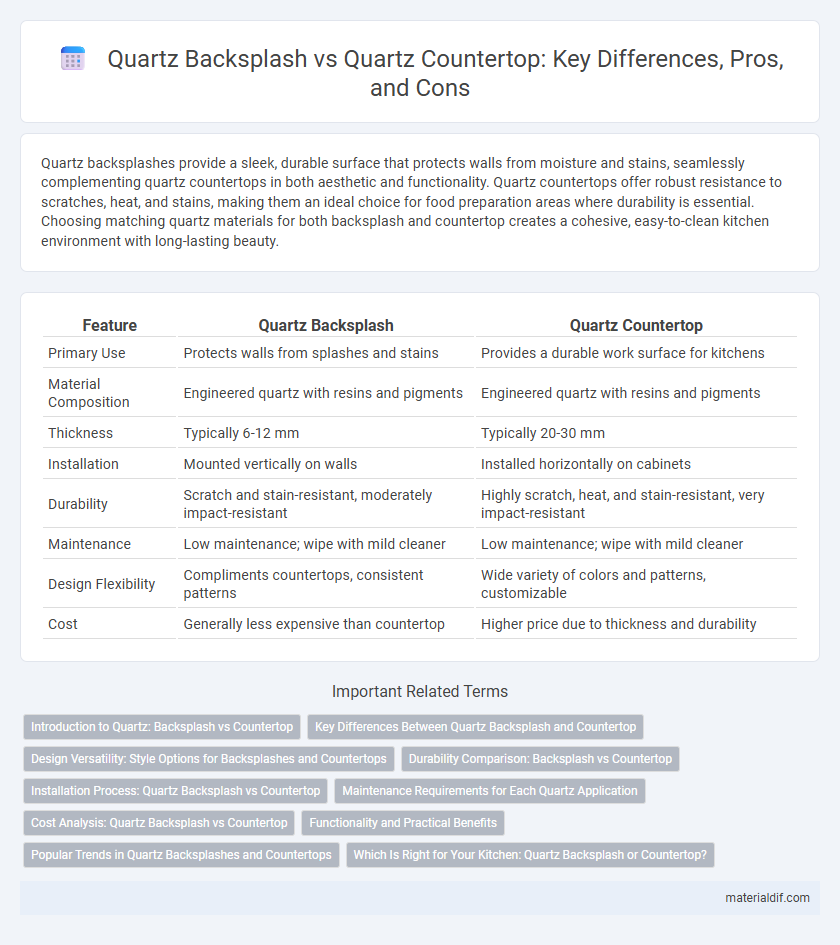Quartz backsplashes provide a sleek, durable surface that protects walls from moisture and stains, seamlessly complementing quartz countertops in both aesthetic and functionality. Quartz countertops offer robust resistance to scratches, heat, and stains, making them an ideal choice for food preparation areas where durability is essential. Choosing matching quartz materials for both backsplash and countertop creates a cohesive, easy-to-clean kitchen environment with long-lasting beauty.
Table of Comparison
| Feature | Quartz Backsplash | Quartz Countertop |
|---|---|---|
| Primary Use | Protects walls from splashes and stains | Provides a durable work surface for kitchens |
| Material Composition | Engineered quartz with resins and pigments | Engineered quartz with resins and pigments |
| Thickness | Typically 6-12 mm | Typically 20-30 mm |
| Installation | Mounted vertically on walls | Installed horizontally on cabinets |
| Durability | Scratch and stain-resistant, moderately impact-resistant | Highly scratch, heat, and stain-resistant, very impact-resistant |
| Maintenance | Low maintenance; wipe with mild cleaner | Low maintenance; wipe with mild cleaner |
| Design Flexibility | Compliments countertops, consistent patterns | Wide variety of colors and patterns, customizable |
| Cost | Generally less expensive than countertop | Higher price due to thickness and durability |
Introduction to Quartz: Backsplash vs Countertop
Quartz backsplashes and countertops both utilize engineered quartz, known for its durability, non-porous surface, and wide range of colors and patterns. While quartz countertops serve as the primary workspace in kitchens offering heat and scratch resistance, quartz backsplashes protect walls from splashes and stains while providing a cohesive design element. Selecting between backsplash and countertop designs involves considering function, thickness, and installation specifics tailored to each application.
Key Differences Between Quartz Backsplash and Countertop
Quartz backsplashes provide vertical protection against splashes and stains, typically installed 4 to 6 inches above countertops, while quartz countertops serve as the primary horizontal workspace with thickness ranging from 2 to 3 centimeters for durability. The fabrication process for countertops involves enhanced sealing and polishing to withstand heavy use and impacts, whereas backsplashes emphasize ease of cleaning and visual appeal. Differences in installation methods also include anchoring backsplashes to walls versus securing countertops to cabinetry, impacting overall kitchen design and functionality.
Design Versatility: Style Options for Backsplashes and Countertops
Quartz backsplashes offer a wide range of design versatility with various colors, patterns, and finishes that complement countertops while providing visual continuity or striking contrast. Quartz countertops stand out for their durability and extensive style options, including polished, honed, and textured surfaces that influence overall kitchen aesthetics. Both options allow customization to suit modern, traditional, or transitional designs, ensuring cohesive and personalized kitchen environments.
Durability Comparison: Backsplash vs Countertop
Quartz countertops offer superior durability compared to quartz backsplashes due to their thicker construction and enhanced resistance to heat, scratches, and stains. While quartz backsplashes provide a consistent aesthetic and moderate protection against moisture and impacts, their thinner profile makes them more susceptible to chipping or cracking under heavy pressure. The countertop's robust composition ensures long-term resilience in high-use kitchen areas, making it a more durable choice than quartz backsplashes.
Installation Process: Quartz Backsplash vs Countertop
Quartz backsplash installation involves securing thinner, lighter slabs vertically with strong adhesives and often requires precise cutting to fit around outlets and cabinets. Quartz countertop installation demands heavy-duty support structures due to the thicker and heavier slabs, with careful leveling and seam placement to ensure durability and aesthetics. Both require professional expertise, but countertops pose a greater challenge due to weight management and structural considerations.
Maintenance Requirements for Each Quartz Application
Quartz backsplashes require minimal maintenance, typically needing only regular wiping with mild soap and water to prevent stains and buildup. Quartz countertops demand more frequent cleaning due to constant exposure to food, oils, and spills, but they also resist stains and scratches well with proper sealing. Both applications benefit from avoiding harsh chemicals and abrasive materials to maintain their polished finish and durability.
Cost Analysis: Quartz Backsplash vs Countertop
Quartz backsplashes generally cost less than quartz countertops due to smaller surface areas and lower material requirements. On average, quartz countertops range from $50 to $100 per square foot, while quartz backsplashes typically fall between $30 and $60 per square foot. Labor costs for installation also tend to be lower for backsplashes, contributing to overall budget savings in kitchen remodeling projects.
Functionality and Practical Benefits
Quartz backsplashes offer excellent protection against water splashes and stains, enhancing kitchen hygiene with easy-to-clean surfaces. Quartz countertops provide durable, heat-resistant workspaces ideal for food preparation and heavy use, combining aesthetic appeal with high functionality. Both surfaces resist scratches and stains, ensuring long-lasting practical benefits in busy kitchen environments.
Popular Trends in Quartz Backsplashes and Countertops
Quartz backsplashes and countertops have surged in popularity due to their durability, low maintenance, and wide array of design options. Trending quartz backsplashes often feature bold patterns and textured finishes that create striking visual contrasts against sleek quartz countertops in neutral tones. Homeowners increasingly favor integrated quartz surfaces for seamless aesthetics, combining backsplashes and countertops that enhance both functionality and modern kitchen style.
Which Is Right for Your Kitchen: Quartz Backsplash or Countertop?
Quartz countertops provide durability and a seamless work surface ideal for kitchen tasks, while quartz backsplashes offer a stylish, easy-to-clean protective barrier against spills and splashes. Selecting between quartz backsplash or countertop depends on your kitchen's functional needs and design preferences, balancing maintenance with aesthetic appeal. Both options deliver stain resistance and long-lasting beauty, making them practical choices for modern kitchen upgrades.
Quartz Backsplash vs Quartz Countertop Infographic

 materialdif.com
materialdif.com